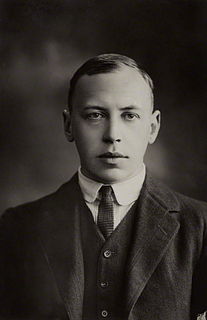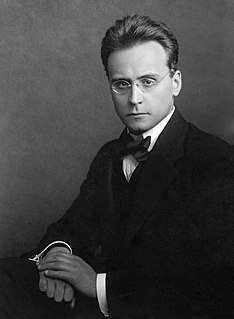A Quote by Lascelles Abercrombie
There is only one thing which can master the perplexed stuff of epic material into unity; and that is, an ability to see in particular human experience some significant symbolism of man's general destiny.
Related Quotes
There is a great difference, whether the poet seeks the particular for the sake of the general or sees the general in the particular. From the former procedure there ensues allegory, in which the particular serves only as illustration, as example of the general. The latter procedure, however, is genuinely the nature of poetry; it expresses something particular, without thinking of the general or pointing to it.
The story of scientific discovery has its own epic unity-a unity of purpose and endeavour-the single torch passing from hand to hand through the centuries; and the great moments of science when, after long labour, the pioneers saw their accumulated facts falling into a significant order-sometimes in the form of a law that revolutionised the whole world of thought-have an intense human interest, and belong essentially to the creative imagination of poetry.
Destiny ... a word which means more than we can find any definitions for. It is a word which can have no meaning in a mechanical universe: if that which is wound up must run down, what destiny is there in that? Destiny is not necessitarianism, and it is not caprice: it is something essentially meaningful. Each man has his destiny, though some men are undoubtedly "men of destiny" in a sense in which most men are not.
But those dealing in the actual manufacture of mind are dealing in a very explosive material. The material is not merely the clay of which man is master, but the truths or semblances of truth which have a certain mastery over man. The material is explosive because it must be taken seriously. The men writing books really are throwing bombs.
The principal, the only, thing a man makes, is his condition of fate. Though commonly he does not know it, nor put up a sign to this effect, "My own destiny made and mended here." (Not yours.) He is a master workman in the business. He works twenty-four hours a day at it, and gets it done. Whatever else he neglects or botches, no man was ever known to neglect this work. A great many pretend to make shoes chiefly, and would scout the idea that they make the hard times which they experience.
Good art means the ability of any one man to pin down in some permanent and intelligible medium a sort of idea of what he sees in Nature that nobody else sees. In other words, to make the other fellow grasp, through skilled selective care in interpretative reproduction or symbolism, some inkling of what only the artist himself could possibly see in the actual objective scene itself.
The significance of a fact is relative to [the general body of scientific] knowledge. To say that a fact is significant in science, is to say that it helps to establish or refute some general law; for science, though it starts from observation of the particular, is not concerned essentially with the particular, but with the general. A fact, in science, is not a mere fact, but an instance. In this the scientist differs from the artist, who, if he deigns to notice facts at all, is likely to notice them in all their particularity.
You are different from the really great man in only one thing: The great man, at one time, also was a very little man, but he developed one important ability: he learned to see where he was small in his thinking, and actions. Under the pressure of some task which was dear to him he learned better and better to sense the threat that comes from his smallness and pettiness. The great man, then, knows when and in what he is a little man.
The citizens of a city are not guilty of the crimes committed in their city; but they are guilty as participants in the destiny of [humanity] as a whole and in the destiny of their city in particular; for their acts in which freedom was united with destiny have contributed to the destiny in which they participate. They are guilty, not of committing the crimes of which their group is accused, but of contributing to the destiny in which these crimes happened.
The power, indeed, of every individual is small, and the consequence of his endeavours imperceptible, in a general prospect of the world. Providence has given no man ability to do much, that something might be left for every man to do. The business of life is carried on by a general co-operation; in which the part of any single man can be no more distinguished, than the effect of a particular drop when the meadows are floated by a summer shower: yet every drop increases the inundation, and every hand adds to the happiness or misery of mankind.
Unity is surely the indispensable thing if meaning is to exist. Unity, to be very general, is the establishment of the utmost relatedness between all component parts... the aim is to make as clear as possible the relationships between the parts of the unity; in short, to show how one thing leads to another.






































